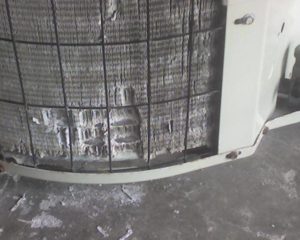I was on the ferry on my way to Nantucket the other day and I looked up onto the top deck of the boat (I’m sure there’s a name for that, but I’m still trying to figure out starboard and port, so you’re going to have to settle for top deck) and saw the most decrepit rusty old condensers that ever attempted to cool a space. So, I of course, immediately point them out to my husband and begin touting the virtues of coated coils vs. standard coils for maritime use. He rolled his eyes and gave a mental thank you to whomever allowed the service of beer on said rusty vessel.

Did I mention it was the “slow” ferry? For those of you who aren’t familiar with the Massachusetts ferry system, there are two options from Hyannis to Nantucket – the fast ferry which zips to Nantucket in under an hour, or if you miss that one (like we did…oops!) or have a vehicle to transport to the island, there’s a SLOW ferry, which lumbers to Nantucket in two hours and 15 minutes, but feels like four hours if your wife insists on discussing the finer points of condenser coils during your trip.
Since my husband doesn’t appreciate my fascinating discussion about condenser coils, I thought I would treat the world (or at least my Mom, who regularly reads my blogs – Hi Mom!) to my story. So here it is…
There have been studies showing that salty ocean air can damage coils to less than 50% efficiency within just ONE YEAR. Those little “fins” that make up a condenser coil (see pic below) are very important to the proper function of your condenser. They are constructed to withstand all kinds of outdoor weather including sun, snow, acid rain, etc. and generally do a pretty good job lasting between 15-20 years under normal conditions. However, in harsher environments where salty ocean air, chemicals or other corrosive conditions (like the neighbor’s dog constantly peeing on it) exist, we generally recommend upgrading to coated condenser coils. The coating provides extra protection against the corrosive conditions, and should (if applied correctly) improve the longevity of your coils without compromising the operation of your unit.

There are spray-on aftermarket coatings that can be applied in the field, but I wouldn’t recommend using them unless you’ve eliminated all other options. Generally, if you’re discovering that you need the coating AFTER installation, it’s already too late for your poor coils. And let’s face it, spray-on options are generally NOT wise investments. Just think about spray tans, spray-on bald spot concealers (yes, they have such a thing. Google it!), they never quite match up to the real thing. No offense intended to spray tan/hair users, of course. It’s just that if the spray-on coating is applied incorrectly to the coil, it can cause efficiency problems and even damage your compressor. Not true of your spray hair.
Coils coated by the manufacturer are submerged repeatedly in the coating material, so the coverage is total and uniform, then they allowed to cure or are baked to secure the coating. In addition to a superior process that results in a better coating, when you purchase the coil direct from the manufacturer, you’ve got a much better shot at a warranty if anything does go wrong.
The Nantucket ferry is a perfect example of an application where these coated coils were clearly needed. We’ve also used them on rooftop units located on buildings close to the ocean, as well as in the world’s greatest linguica (that’s Portuguese sausage for you unfortunates who’ve never had the pleasure) factory, where the evaporator (indoor) coils were prematurely corroding due to the acidic environment that the spices and vinegary deliciousness created. Evaporator coils can also be coated for unfriendly indoor environments, as well. In each of these cases, the coating provided extra protection to the coils to give them longer life without significantly impacting unit efficiency or capacity.
For more info, check out this article from ACHR News. Trane and Carrier also go into some detail on the actual electro-chemical process involved in the coating application, if you’re into that kind of thing.
If you think that coated coils might be right for you, give us a call. I promise I won’t make you read about the electro-chemical process, or hear my 2 hour and 15 minute discussion on the topic, I’ll just match you up with the right coils to fit for your unit and your budget.
